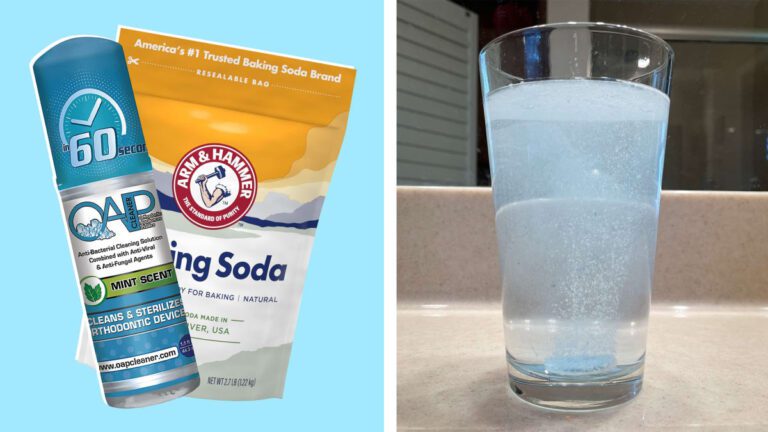If you’re reading this article, then you probably (like me) dread cleaning your retainer or dentures. It can be unpleasant at best to look too closely at any mouth-related accessory, and actually cleaning them can feel like a Herculean task. As you may already know, standard toothpaste and mouthwash won’t cut it, making the process even more confusing.
Fortunately, the clever minds behind dental products understand the average user’s aversion to this chore. Store-bought retention cleaners can do the job in anywhere from 60 seconds to 15 minutes. There are also some super simple DIY options that are just as effective, although using them may require a little more work on your part.
Keep reading to learn how to clean dentures, retainers, and other oral appliances with some of the best (and easiest) products. Although our tests focused on retainers, most of these cleaning products and tips can also be applied to other teeth-related accessories, such as mouth guards, aligners, and dentures. When in doubt, always check with your dentist to see which method he recommends for your product.
How to clean your retainer with a soak
Credit: Review / Anna Wenner
If you use a soaking solution to clean your retainer or dentures, remember to keep the water lukewarm and not too hot.
Step 1: Gather your materials
Here’s everything you need to create a quick and gentle soak clean.
- Your retainer or denture (ideally right after use so it’s still wet)
- Cup or container to hold water
- Selected retainer or denture cleaner
- Telephone or timer
Step 2: Fill your container with hot water
It is important that the water is lukewarm rather than hot when soaking dentures or a retainer, as excessive heat can be a dental accessory’s worst enemy. Using hot water can cause warping that renders the retainer useless, and it won’t matter how clean the retainer is if you can no longer wear it.
Step 3: Create the solution and place the retainer inside
If you are using a pre-made solution, be sure to read the directions and follow the steps listed on the box for best results. Some will ask you to completely dissolve a tablet, while others may indicate that the holder and tablet should fall together.
For a DIY method, always create the solution before adding the retainer to avoid prolonged exposure to undiluted ingredients.
Step 4: Rinse thoroughly with water and return to case
Here you can use the same water temperature as you did for cleaning. Store the product in your case as directed by your dentist when you first received it. If it is going to be stored dry, make sure it is kept somewhere with ventilation and consider drying it with a paper towel before returning it to the case.
How to clean your retainer with brushing
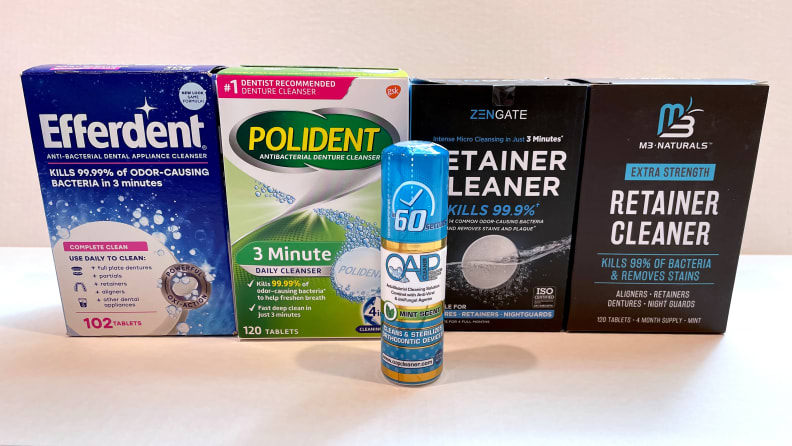

Credit: Review / Anna Wenner
These are some of the most popular solutions for cleaning dentures or retainers.
It is best to consult your dentist before trying a brushing-related cleaning method because some plastic retainers can be made of a highly porous material that can easily be scratched and eroded by the force of brushing. However, if you’re sure you’ve been told to brush, the following steps can help you do it quickly and easily.
Step 1: Gather your materials
If you prefer to brush your retainer or dentures, here’s what you’ll need.
- Your retainer or denture (ideally right after use so it’s still wet)
- Soft-bristled toothbrush (one that will only be used on your accessory, not your natural teeth)
- Cotton swabs (optional, but can be helpful)
- Featured cleaner
Step 2: Add cleaning solution to your retainer
Apply a generous amount of your chosen cleaning solution directly to the retainer or denture.
Step 3: Gently brush the retainer
Using your toothbrush, gently brush the cleaning solution on both sides of your retainer, being careful to get into the crevices where food and plaque can get trapped. Use a cotton swab for any particularly deep areas.
Step 4: Rinse thoroughly with water
Warm water is usually best for this, but if you have trouble telling the difference between “warm” and “hot,” stick to colder water.
Step 5: Store in a case
Return your retainer to its case following the same steps as Step 4 in the soaking section.
Don’t forget to clean your case
Retainers can often have even more bacteria than the retainers themselves because they get less attention during cleaning and less downtime for bacteria to grow. Most holders can be cleaned with regular dish soap or even placed in the top rack of your dishwasher. Try to clean your holding case at least once a week.
Types of cleaning solutions
Prepared impregnation solutions
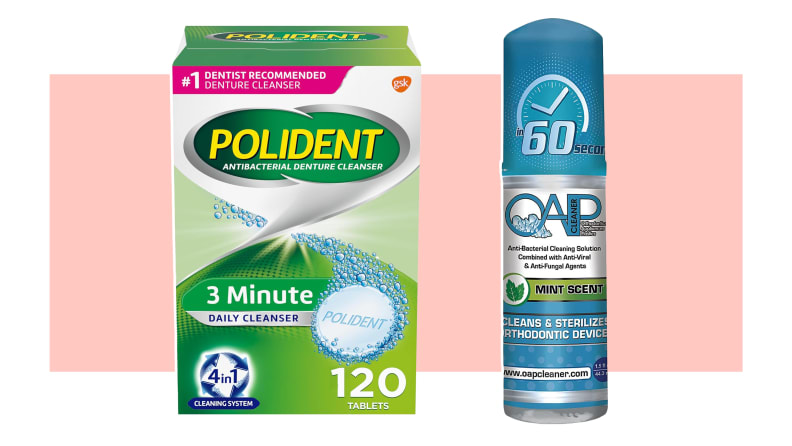

Credit: Reviewed / Polident / OAP
Pre-made solutions can offer the simplest method of cleaning your retainer.
Tablets for impregnation: This method can be a quick and easy way to clean your retainer in as little as three minutes or as little as overnight. Some of the more popular brands include Zengate, Polident, Efferentand M3 Naturals. We found little to no difference between the user experience and perceived cleaning power of these four products in testing, and each is specifically designed to keep accessories clean.
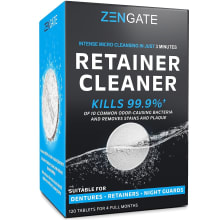

Zengate Retainer Cleaner Tablets
These tablets can clean your dentures or retainer in just three minutes.
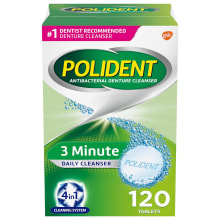

Polident 3 Minute Denture Cleanser Tablets
Polident has four active cleaning ingredients that kill 99.99% of odor-causing bacteria and viruses.
Foam for brushing: OAP cleaner is a popular foam that can be used to brush your dentures or retainer, cleaning in just 60 seconds.
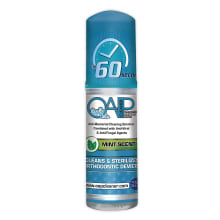

OAP Foam Retainer Cleaner
If you have 60 seconds, this foam spreads easily and cleans a wide variety of oral appliances.
DIY cleaning solutions
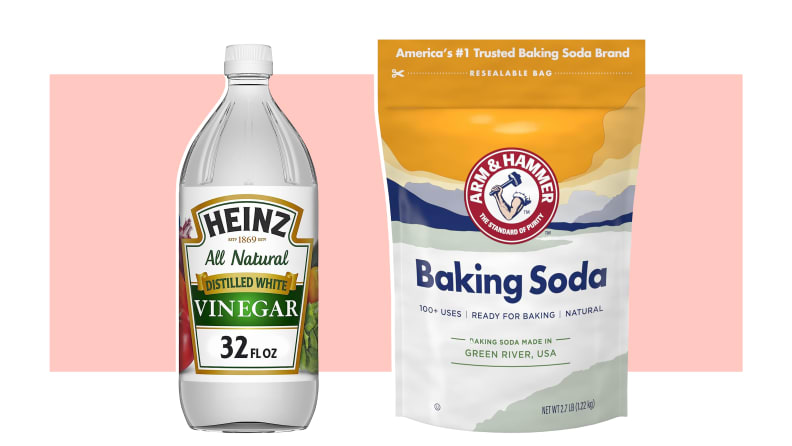

Credit: Reviewed / Heinz / Arm & Hammer
Trusted kitchen products like baking soda and white vinegar offer an easy and inexpensive cleaning alternative when no on-demand product is available.
Creating your own cleaning solution with white vinegar or baking soda can be an inexpensive, natural way to keep your retainers or dentures in tip-top shape. They also haven’t persulfateswhich may cause allergic reactions in some people.
Soak in white vinegar: This is a non-toxic, cheap and easy solution to impregnate your retainer.
- Directions: Combine 50% water and 50% white vinegar.
- Soak for 20 minutes and then rinse your retainer thoroughly with water.
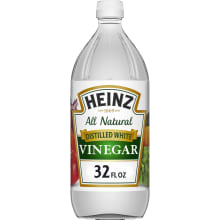

Heinz All Natural Distilled White Vinegar
If you’re on a budget, this white vinegar can be a decent cleaning alternative for just a few bucks.
Baking soda paste for brushing: For brushing, a combination of baking soda and water can be used. However, be careful how long you brush metal-based retainers with this solution, as it can corrode the metal with prolonged exposure.
- Directions: Combine 50% water and 50% baking soda, aiming for a paste-like consistency.
- Gently brush the paste along your retainer or denture, then rinse thoroughly with water.
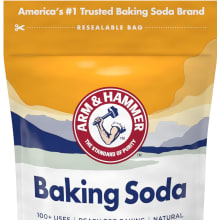

Arm & Hammer Baking Soda
Baking soda is a long-trusted dental care supply and is an effective denture and retainer cleaner.
Ultrasonic cleaners
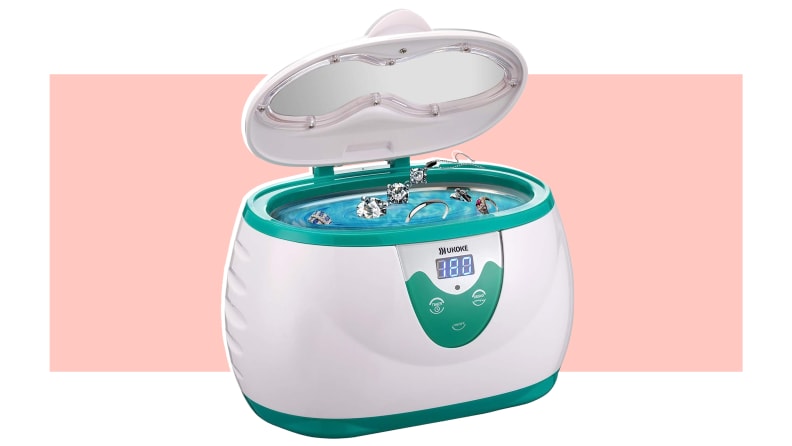

Credit: Reviewed / UKOKE
An ultrasonic cleaner is quick and easy to use, but convenience comes with a high price.
Although the price jump is quite large between the above solutions and the acquisition of an ultrasonic cleaner, they deserve to be classified as a safe cleaning method for cleaning retainers and other dental appliances. The Ultrasonic cleaner from Ukoke is an excellent economical choice for the maintenance of retainers and dentures. You can use just water or add a small amount of (mouth-safe) liquid dish soap for a stronger clean.
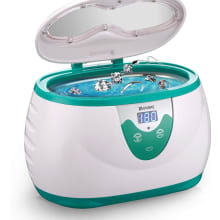

Professional ultrasonic jewelry cleaner Ukoke 3800S
This popular ultrasonic cleaner has cycles ranging from 90-480 seconds.
Although it is a bit on the expensive side, the Zima Dental Pod it is also a popular choice for its elegant appearance and powerful cleaning.
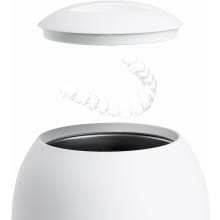

Zima Dental Rose Pink Dental Pod
If you prefer a professional-grade solution, the Zima Dental Pod offers dental office-level cleaning in a thorough five-minute cycle.
What you need to know about cleaning your retainer
Once you’ve chosen your cleaning method and supplies, these general oral health tips should ensure that your dentures, retainers, or other similar products maintain their desired shine.
A little cleaning is better than none: There’s no shame in falling behind on your supposedly regular cleaning routine. We all struggle to motivate ourselves for various reasons. Just remember that cleaning is better than cleaning at all.
How often should you clean your retainer: You’re supposed to clean your retainers and dentures daily, but once a week is probably a reasonable minimum if you’re really pressed for time. However, these fast-acting cleaners will help with that.
Check with a professional: As we have already said, always consult a dentist before using any cleaner on your expensive mouthpiece.


